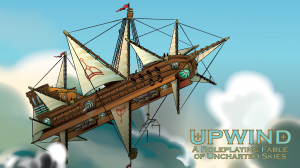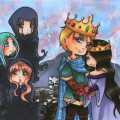 Sponsor: Biohazard Games is running a Kickstarter for Upwind. If you enjoy this AP, back the game! Ross is set to write a campaign for Upwind as a stretch goal.
Sponsor: Biohazard Games is running a Kickstarter for Upwind. If you enjoy this AP, back the game! Ross is set to write a campaign for Upwind as a stretch goal.
Synopsis: Wherein the player characters are Knights of the Guild’s 5th Fleet, obligated by the Treaties of the Convocation to police the skies of the failing nation of Vault. Recently, the region has come under siege by the Dread Pirate Margit (pronounced Mar•geet) and her heavily armed frigate Hawk. The characters undertake a clever false flag mission posing as desperate merchants in an attempt to lure Margit out into the open and bring her to justice. Unfortunately, in the dangerous skies of Upwind things are not always as they seem and the Knights may learn that even great wrongs can sometimes be right.
Podcast: Play in new window | Download (Duration: 3:19:02 — 68.5MB)
Subscribe: RSS






so i really like the other upwind ap but this isnt an ap just rule and sorry but its just boring, like really boring. good try guys.
Fun episode, I’m really liking the idea of having the deck instead of dice. GM jokers still feel kind of meh to me, honestly. I’m sure it would be fine for most people, personally I don’t know if I’d enjoy negotiating stakes with a chance of an auto-fail (dice can fail, but off the top of my head I can’t think of a system that has it on manual). If Jeff had played a joker in that last fight he’d be the next Ross, but if he had crowned it? In terms of the story that would have been really interesting (and really interesting for their character arcs), but as a player in terms of enjoyment I think it’d fall flat.
When you’re constructing the decks, are all the cards included? If so, there could be room for (maybe alternate) rules that remove lower numbered cards either from his deck entirely, or as a “climatic scene, GM cards are minimum 5”, or as the campaign advances something like “GM can play a 2 and a 3 as 1 card”.
If you’ve played dungeon world (or any of the *world games), the best thing that happens is those 7-9 rolls where they succeed but at a cost. Maybe some of those low point GM cards could have that effect. Makes a low value GM hand still interesting, or lets them hedge a higher value setup a bit.
Hi Stewverbal,
Sorry the set-up was slow. New players and a large group. The story picks up pretty quickly though and we all had a great time taking on the Dread Pirate!
Thanks for listening.
J-
Hi Zypher,
The Q system is a little different and so requires a bit of a paradigm shift. The cards do not only replace dice, they support meta mechanics that intentionally promote cooperative storytelling. An essential conceit of the system is that NPCs and PCs may be adversaries but the moderator and the players should never be. The Q system depends on all participants trusting each other to tell good stories. As a result, I would never have played a joker (even if I’d had one!) in that final escape because it was a one shot and would have ruined the story we had just spent 3 hours creating together.
If instead the game had been just one session of a campaign, [avoiding spoilers] I would have negotiated slightly different outcomes and perhaps played the joker to create an awesome cliffhanger in anticipation of the next session – something I would not have been able to intentionally structure with a more traditional system.
Here are two sections of text from the core book that offer some good insight into ways Q is different and how the moderator can use use his or her cards to exploit those differences in positive ways.
“Fudging or Nudging
Unlike games where dice make success or failure a matter of random chance, the Q system intentionally provides a degree of control over the odds. By purposefully playing particularly high cards participants can improve their chances of taking the given stakes. By cleverly negotiating stakes they are willing to lose and then playing particularly low cards, players can shed a bad hand, and moderators can give the characters an advantage or shape the direction of the plot.
This ability to nudge the outcomes is a feature of the system and should be exploited. Moderators can help or hinder the players as fits the game, without having to fudge the rules. Every moderator knows that there are times when the story, pacing or table dynamic is such that it would be best if the characters succeeded. Conversely, there are times – usually for reasons of drama or plot – when it would be more interesting if the characters failed. The Q system provides a mechanic to nudge the narrative in such directions without having to use GM fiat. Accordingly, both players and moderators should confidently bid whatever cards they have to win – or intentionally lose – a given play. It’s part of the game.”
“Challenge Mode
It is tacitly understood that in most RPG the players ultimately achieve their primary goals. Every good adventure has setbacks and challenges but in the end the characters usually succeed. Accordingly, like the mechanics of most games, Q is biased towards player success. Players have larger total hands (10 cards) than the moderator and more bonus cards (see Caches) and they can help each other make plays (see Teamwork). Unlike most roleplaying games however, where failure of a single attack roll or skill check does not usually have major consequences, losing a bid can have profound effects on an Upwind adventure. This is impact intentional and part of making stories with consequence, but it does take a little getting used to.
If a group’s style of play favors fewer setbacks or easier challenges, then the moderator can opt to reduce the overall difficulty by reducing his own hand size to 7 cards, thereby reducing the frequency of high cards in his hand. Conversely, if the group feels play is too easy or wants to face more challenging encounters, the moderator can bump his hand size to 9 cards. Larger reductions or increases are not recommended as they leave the moderator problematically under or overpowered.”
And regarding your questions about the the 2 and 3 value cards – all the cards (save one of the jokers) are kept in each participant’s deck. There are special “teamwork” rules for the 2s and 3s that make them valuable to the players but currently they are just 2s and 3s for the GM.”